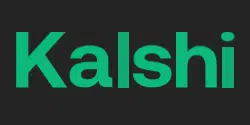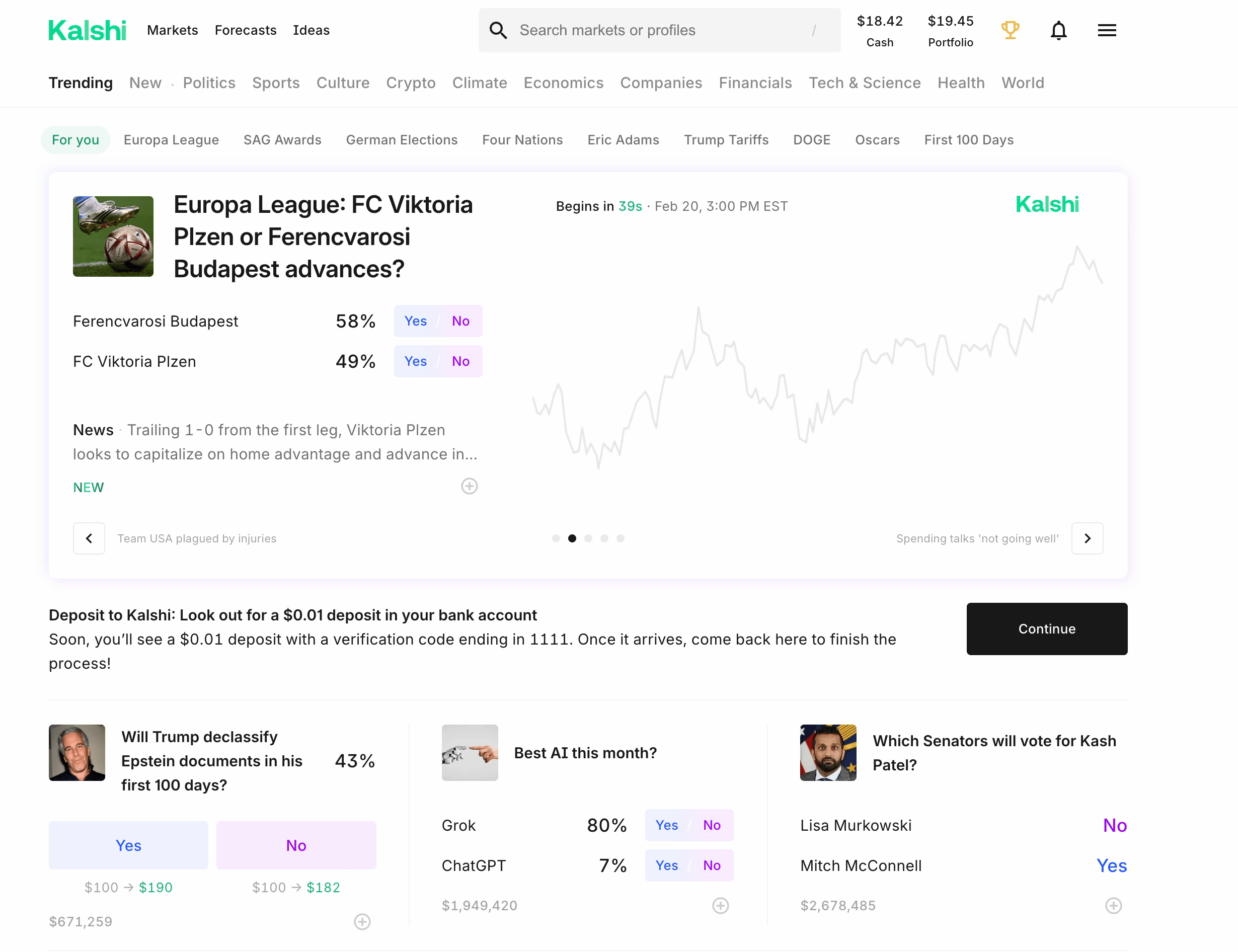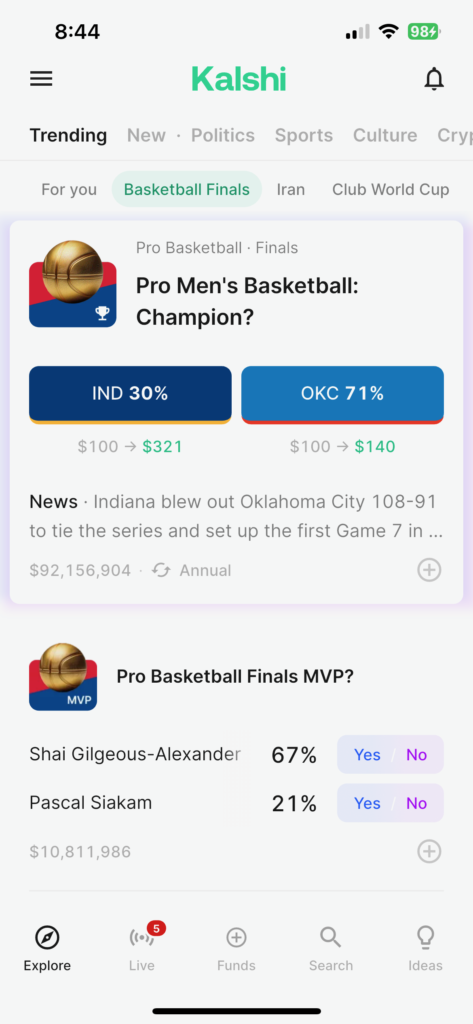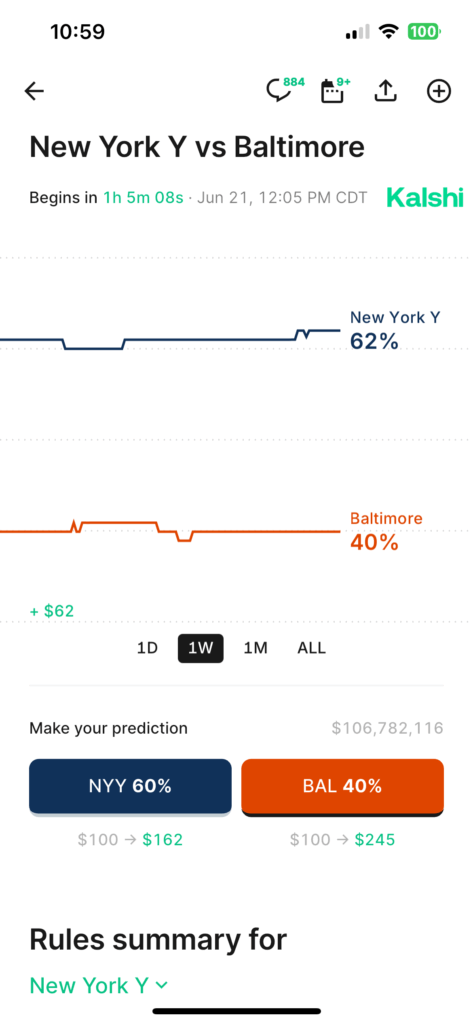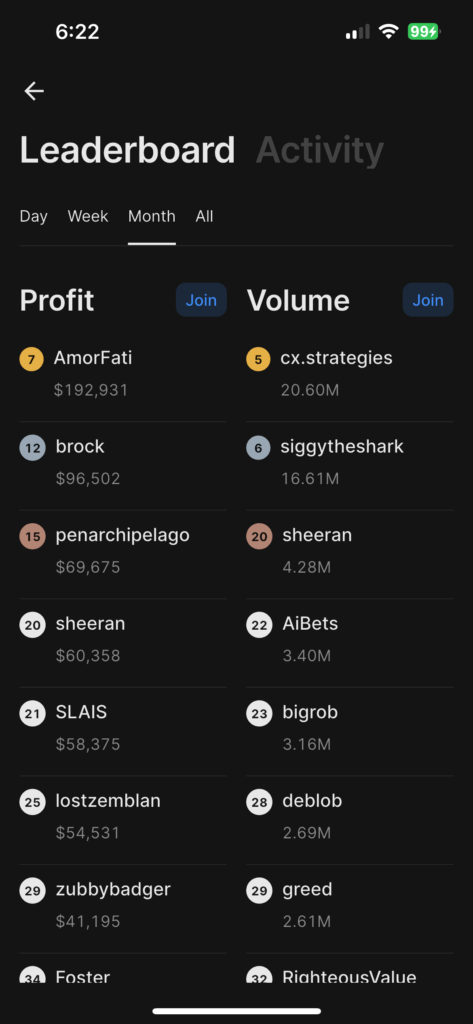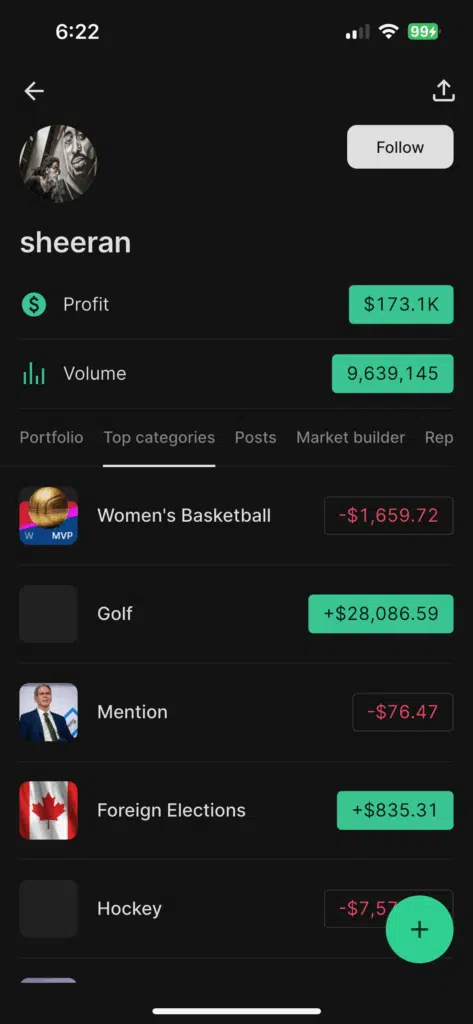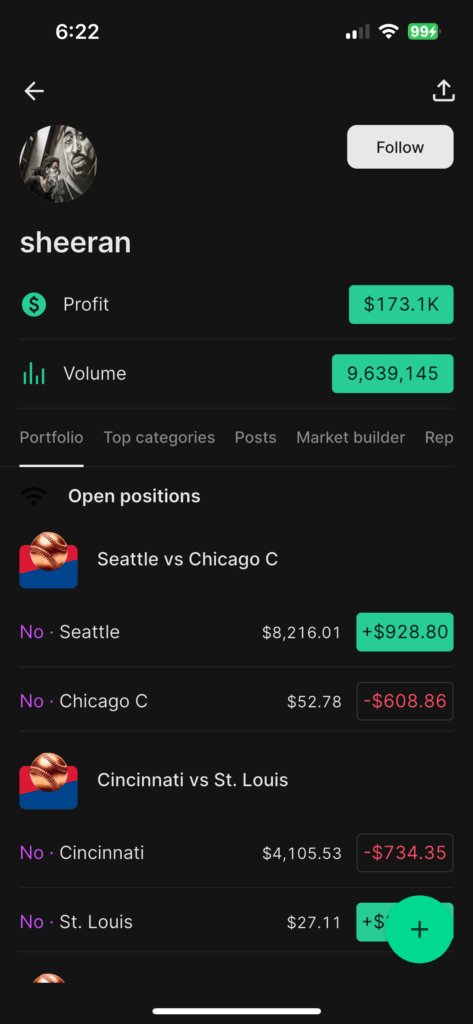Kalshi Review
Kalshi is a legal prediction market that enables customers to buy and sell “yes or no” contracts on a vast range of topics, ranging from sports and politics to the weather and pop culture.
Unlike conventional online sportsbooks, Kalshi operates under federal derivative laws. It is registered with the Commodity Futures Trading Commission (CFTC) as a designated contract market, allowing it to offer event trading in all fifty states.
Read on for our full Kalshi review. Below, we explain how Kalshi works, what types of sports it covers, and how it compares to online sportsbooks.
Pros
Available in all 50 states Interest on cash balance + holdings Low fees Shared liquidity across 140+ countries Responsible risk management toolsCons
Few bonuses and promos Limited in-play trading Limited parlay-style marketsKalshi Referral Code
Kalshi offers a $10 bonus to new users who sign up with a valid referral code and complete $100 worth of trading activity.
The Kalshi bonus does not have a minimum deposit requirement, but new customers do have to deposit enough to begin trading and place at least $100 worth of trades (win or lose – doesn’t matter).
New customers can input the Kalshi promo code by selecting “add referral code” on the date of birth form during registration:

Kalshi Explained
Kalshi offers a different approach to predicting sports outcomes. Instead of point spreads and moneylines like traditional sportsbooks, Kalshi lets users trade on the outcomes of specific events using simple “yes or no” contracts.
Each contract poses a simple “yes or no” question, such as “Will Team X win Sunday’s game?” or “Will there be a recession this year?”
Contract prices range from $0 to $1, reflecting the market’s collective confidence that the event will happen.
If the event occurs, each contract settles at $1.00. If the event does not happen, each contract settles at $0.
The difference between what you paid and what you receive (or don’t) determines your profit or loss.
How Kalshi Works: An Example
Here’s a pair of contracts Kalshi offered for an upcoming NBA game:

Contract Pricing and Market Sentiment: Each contract trades at a market-determined price based on supply and demand:
- If YES contracts for Oklahoma City are priced at $0.66, it suggests the market believes there’s a 66% chance the Thunder will win.
- If YES contracts for Indiana are priced at $0.34, it indicates the market believes the Pacers have a 34% chance.
These prices shift as users trade, much like the prices on a stock exchange.
Buying Contracts: Kalshi users can buy or sell contracts based on their predictions. Let’s say you believe Oklahoma City will win:
- You buy 100 YES contracts at $0.66 each
- Your total cost is $66
Settlements and Payouts: Once the game ends, Kalshi settles the contracts based on the result:
- If Oklahoma City wins, each contract pays $1. You receive $100 for a $34 profit ($100 payout minus $66 cost)
- If Oklahoma City loses, the contracts expire worthless, and you lose your initial $66.
Kalshi Sports Markets
Kalshi introduced sports event contracts in 2025 and has steadily expanded the range of events it covers, all structured around clearly defined yes-or-no questions.
Kalshi’s offerings now include individual games, championship events under a wide range of sports, including:
- Football: NFL and college games, division/season championships, team win totals, player awards, NFL policy decisions, head coach changes, draft picks
- Baseball: MLB games and division/season championships, college baseball championships, team win totals, player awards
- Basketball: NBA, WNBA, and college games, conference/season championships, March Madness winners/qualifiers/round advancements, player awards, draft picks
- Soccer: MLS and international soccer games, tournament championships, World Cup qualifiers, player trades, FIFA policy decisions
- Hockey: NHL and IHF games and championships, player awards, 4 Nations Face-Off winner,
- Golf: PGA, LIV Golf, Ryder Cup, Solheim Cup tournament winners/who will make the cut
- Motorsports: F1 race winners, podium finishes, and season champions, Indy 500 winners
- Tennis: ATP and WTA Grand Slam champions, match winners,
- Esports: Tournament winners, Game Awards picks
- MMA: UFC matchups
Each sports event contract is based on a specific, objective outcome. Some examples include:
- Will the Los Angeles Dodgers beat the New York Yankees tonight?
- Will the Dallas Cowboys win more than 8.5 games this season?
- Will Novak Djokovic reach the Wimbledon semifinals?
- Will Alex Palou win the Indy 500?
- Will Rory McIlroy win the Masters Tournament?
- Will Player X score the game’s first touchdown?
Kalshi also offers “combo contracts” that are the trading equivalent of parlays, same game parlays, and custom parlays (see the next section for an explainer).
Kalshi Combos
Kalshi’s “combo contracts” combine multiple event outcomes into a single parlay-style contract.
Combo contracts function similarly to traditional sports betting parlays, except Kalshi structures them as binary yes/no contracts that settle at $1 if all legs resolve affirmatively or $0 otherwise.
In short, Kalshi combos are simply single contracts that bundle multiple questions into one outcome that either resolves as “yes” or “no.”
For example, a Kalshi combo might ask, “Will the Atlanta Falcons and the Dallas Cowboys win?”
If you buy YES contracts, they’ll settle at $1 if both teams win their games. If either or both teams lose their games, your YES contracts will settle at $0.
Build Your Combo (Custom Parlays)
In late 2025, Kalshi debuted custom “build your combo” contracts, initially on a limited basis for select prime-time NFL games.
Most “build your combo” contracts are equivalent to same-game parlays (SGPs), allowing users to select and combine multiple legs from the same game into a single contract.
For example, traders can combine outcomes on game winners, player props, and totals all within a single game or across multiple games.
Comparing Kalshi Combos to Sportsbook Parlays
Kalshi combos aim to mimic traditional sports betting parlays, but there are some key differences between the two:
- Availability: Kalshi combos are still more of a beta testing product than a polished offering. Kalshi doesn’t always offer combos. Sometimes they’re available under any sport’s main navigation tab, sometimes Kalshi doesn’t offer any combos, and (frustratingly) doesn’t make it clear whether they’re available on any given day.
- Options: Standard online sportsbooks still offer far more parlay betting options, customizability, and variety. In contrast, Kalshi’s parlays are limited to select games and don’t allow as many different possible combinations. However, Kalshi has steadily expanded its combo options since their launch.
- Mechanics: Because Kalshi is an exchange, it cannot just automatically generate odds for any parlay you build. Instead, Kalshi submits your custom combo as a Request for Quotation (RFQ) to other traders on the exchange, primarily institutional market makers. They then analyze the components of your combo and offer a price, which you can accept or reject.
Despite those differences, Kalshi combos do feel a lot like regular parlays. Even more importantly, the pricing is competitive. Kalshi’s combo contracts usually offer payouts that are right in line with the payouts online sportsbooks offer for custom parlays.
Other Kalshi Prediction Markets
Although Kalshi gained mainstream prominence in 2025 thanks to its nationwide sports event contracts, the platform’s prediction offerings extend far beyond sports.
On any given day, Kalshi runs hundreds of prediction markets under the following overarching categories:
- Politics: US elections, bills, presidential agendas, culture war, foreign elections, SCOTUS rulings, debt ceilings and shutdowns, cabinet picks, education reform, immigration policy, approval ratings
- Culture: New release Rotten Tomatoes scores, Nobel Peace Prize winner, TIME Person of the Year, the next James Bond, top iOS app, Oscar nominations, Spotify top lists, and much more
- Crypto Predictions: Bitcoin and other cryptocurrency prices, Coinbase volume, US and foreign government crypto policies, best crypto performers, crypto developments at major financial institutions
- Climate: Daily highest temperatures in select cities, monthly temperature averages, tornado/hurricane totals, next hurricane/earthquake/tornado/tsunami, US/foreign climate policies, EV market share, snow/rain totals
- Economics: Inflation, growth, interest rates, oil/energy prices and production, employment metrics, layoffs, jobless claims, consumer spending and prices, bankruptcies/defaults, US credit rating
- Mentions: Whether specific words will be used during upcoming speeches, press conferences, earnings calls, debates, and interviews
- Companies: Company-specific predictions like Tesla deliveries, CEO changes, product releases, hiring freezes, video game console sales, etc.
- Financials: Daily foreign exchange rates, daily treasury 10-year yield, S&P highs/lows/daily ranges, crude oil futures, Nasdaq highs/lows/daily ranges
- Tech & Science: AI predictions, meteor strikes, SpaceX achievements, US semiconductor production, moon landings, new drug trials, and other scientific developments
- Health: Measles/Covid/H5N1/other disease case counts, US government health policies, healthcare industry predictions
- World: Geopolitical relations, foreign birth rates, foreign recessions, countries to receive US “do not travel” warnings, global GDP
Some examples of non-sports event contracts include:
- Will the highest temperature in LA exceed 77° today?
- Will Candidate A win the next Presidential election?
- Will Movie X have a Rotten Tomatoes score above 85 on [date]?
- Will an AI-generated song reach the Billboard Hot 100 this year?
- Will Bitcoin exceed X price this year?
- Will egg prices go up this month?
- Will Netflix use the word “churn” during its next earnings call?
- Will WTI oil prices exceed X price tomorrow?
- Will there be a Bird Flu pandemic this year?
- Will it rain in NYC today?
Who Can Use Kalshi?
Unlike online sportsbooks, which are subject to state-level gambling laws, Kalshi operates under a federal regulatory framework that allows it to offer its services to customers in all 50 states. Additionally, Kalshi serves traders in than 140 countries worldwide.
One of Kalshi’s defining characteristics is that it operates a singular, shared global liquidity pool. Here’s how that benefits traders, according to a Kalshi press release:
While other platforms operate with fragmented, region-specific markets, Kalshi’s global exchange connects traders worldwide to the same set of events, deepening liquidity and price discovery across every market.
According to Kalshi’s basic eligibility requirements, users must:
- Be at least 18 years old
- Reside in the United States or any of the 140+ countries where it operates
- Have a valid US address and SSN for identity verification
Additionally, Kalshi restrictions prohibit individuals from trading contracts that they could influence or for which they have access to non-public information.
For example, ESPN employees may not trade contracts related to the ESPN Achievement Awards (ESPY Awards).
Kalshi maintains a comprehensive list of contract-specific trading prohibitions here.
Kalshi Deposit Options
Kalshi accepts a handful of deposit and withdrawal methods that can support transactions of all sizes. Debit card and Apple Pay deposits have 2% processing fees, but all other methods incur no fees.
| Deposit Method | Max | Processing Fee |
| Debit Card (Visa / Mastercard) | $2,500/day | 2% |
| Apple Pay | $2,500/day | 2% |
| Bank Transfer | $10,000 per transaction | None |
| Crypto | $500,000/day | None |
| Wire Transfer | No max (min. $2,500) | None |
Accepted cryptocurrencies:
- USDC
- RLUSD
- SOL
- BTC
- WLD
- XRP
Deposit Processing Times:
- Your first bank transfer deposit makes up to $100 immediately available for trading; the remainder takes 3-5 days to fully clear and be reflected in your Kalshi balance.
- Subsequent bank transfer deposits make up to $250 immediately available
- Crypto and debit card deposits make the full amount immediately available for trading
- Wire transfer deposits sent before 4 PM ET become available within one business day
Kalshi Withdrawal Methods
| Method | Max | Processing Fee |
| Debit Card | $2,500/day | $2.00 |
| Bank Transfer | No max | None |
| Crypto | $2,500/day | Variable |
Withdrawal Processing Times:
- Debit card withdrawals are credited to your card within 30 minutes
- Bank transfers appear in your account within 3-4 business days
- Crypto withdrawals appear in your wallet within 30 minutes; you must have deposited with crypto to withdraw via crypto
How to Deposit at Kalshi
Initiating a Kalshi deposit is easy: open the main menu (on desktop) or hit the “+ Funds” button (on the app) to open the cashier, choose a deposit method, and follow the prompts to fund your account.
Kalshi Fees
Kalshi charges a variable percentage fee based on your expected earnings from a trade.
Users generally pay less commission on Kalshi than at conventional sportsbooks, but its fees can be tricky to understand because they’re not flat percentages like on some other trading platforms.
The formula Kalshi uses for determining trading fees is:
fees = round up(0.07 x C x P x (1-P))
- C = the number of contracts you’re trading
- P = the price of one contract in dollars
- Round up = they round the fee up to the next cent
What this formula means in simpler terms:
- Fees are higher for “50/50” bets: Contracts priced closer to $0.50 have larger raw fees.
- Fees are lower for long shots and heavy favorites: Contracts priced at either extreme (e.g., above $0.95 and below $0.05) have smaller raw fees.
- Fees are generally small: Kalshi’s formula ensures competitive fees, often less than 2% per market and capped at $1.75 for a $100 trade.
Kalshi App Review & User Experience
Kalshi’s uncluttered interface, combined with simple yes/no questions, makes the platform intuitive for users regardless of experience.
Even complete trading notices will have little trouble getting oriented thanks to Kalshi’s homepage, which features descriptive but straightforward market overviews consisting of:
- The prediction question
- Contract price, probability, and payout on a $100 trade
- Rule summary (when contracts settle/how outcomes are verified)
For novices and experienced traders alike, the Kalshi app makes markets easy to navigate and trades quick to initiate.
Similarly, features like the live order book and market graph are well-integrated without being overwhelming.
Just as importantly, Kalshi succinctly describes each market and its resolution criteria (how results are determined) in plain, concrete terms.
Navigation and Trade Execution
Kalshi’s simple design choices and logical menu items facilitate easy navigation and trade execution.
In simple terms, the Kalshi betting app doesn’t try to reinvent the wheel: buttons, menus, and layouts are simple and predictable.
The top navigation menu filters markets by broad categories like sports, weather, entertainment, politics, and so on, while submenus allow users to further refine the results.
For example, the sports submenu allows users to view markets specifically for football, basketball, baseball, and so on. A secondary filter options allow users to sort markets by “trending,” “volatile,” “new,” “closing soon,” and more.
Trade execution mimics placing trades with a simplified book-order model. Users select “Yes” or “No,” choose a quantity, and confirm.
The Kalshi app clearly displays potential payouts, implied probability, and liquidity upfront before users submit their orders, so there are no surprises later.
Social Features
The Kalshi betting app features several simple yet well-executed social elements. Users can view recent trades, follow the platform’s most profitable traders, and submit ideas for future markets – all within the Kalshi app.
One of the standout tools is the leaderboard, which ranks traders by net profits over the past day, week, month, and all-time. If any leaderboard leader’s profile is public, others can view their trading activity, including in which categories they’ve profited the most.
Kalshi also features a community feed where users can discuss their trades, share strategies, submit ideas for new markets, and vote on others’ submissions.
Kalshi Strengths & Weaknesses
Kalshi operates differently than conventional online sportsbooks, and that shows in both its advantages and limitations.
As a regulated predictions market, Kalshi offers low-cost trading, transparency, and a broad scope of markets that extends well beyond sports.
However, the exchange model also means that some features sportsbook users may be accustomed to, like in-play betting and constant liquidity, are absent or limited.
Kalshi Responsible Risk Management
Kalshi offers several tools that customers can use to manage their risk and trade responsibly:
- Trading Break: Temporarily restrict your ability to trade for one day or longer
- Voluntary Opt-Out (Self-Exclusion): Restrict your ability to trade for more extended periods, including permanently.
- Personalized Funding Cap: Set a maximum amount that Kalshi will allow you to deposit per month.
Final Thoughts: Is Kalshi Legit?
Kalshi is a legitimate trading platform registered with the Commodity Futures Trading Commission (CFTC). Kalshi’s regulatory status distinguishes it from unregulated and quasi-legal platforms because it operates under a clear legal framework and consumer protection regulations.
Additionally, Kalshi differs from conventional betting sites in that users trade among themselves, thereby eliminating conflicts of interest. In that way, Kalshi operates more like a traditional stock exchange than a gambling operator.
That said, Kalshi may not be a suitable fit for everyone. It lacks many of the features familiar to sports bettors, like extensive in-play betting markets and hundreds of unique player props per game.
However, sports fans who prioritize low fees and access to a broad range of non-sports markets should consider trying Kalshi.

